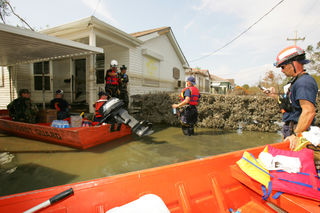Sleep
Ambiguous Loss
How to live with the pain of uncertainty.
Posted September 5, 2017 Reviewed by Ekua Hagan

For the majority of us, the death of a loved one is a finite event. We grieve and mourn. We have markers such as the funeral or death certificate that help us to continue on with our lives without our loved one. However, for some, the loss of a loved one does not have these markers because there is no verification that there has been a death.
Statistics show that in 1980 roughly 150,000 people were reported missing in the United States. Now the number is 900,000. Worldwide, it is estimated that 8 million children go missing every year (Lehnardt, 2017). After the recent hurricane Harvey in Texas, many people are experiencing what it is like to have a loved one or friend missing.
Fortunately, in the days and weeks ahead, there will be many reunions, but for some, that may never happen. At this writing, there is an undetermined number of people missing. Almost every day there is news of someone missing. Having a missing loved one is perhaps the most devastating and traumatic loss because there may never be an answer as to what happened to them.
Pauline Boss (1999) has named this type of loss an Ambiguous Loss. She identifies two types. The first is when a person is physically present but psychologically absent, as in the dementias. The second type, the focus of this article, is when there is a physical absence but a psychological (emotional) presence.
We cannot begin to imagine what the families of the missing go through. They vacillate between hope and despair. They are in their own special type of hell. Initially, after someone goes missing, there is hope. Searches begin, signs go up, and psychics are brought in. However, as the days go by, and it seems that finding the loved one becomes less likely, the despair and torment set in. How do you mourn or should you if you do not know the fate of your loved one? Families can go through years of intense searching and still not have any clues about what happened or where their loved one is.
The impact on the individuals and the family as a unit can be profound. I have worked with some who are like the walking dead. They do what they have to do but basically withdraw from life. They often begin to feel unsafe themselves, which only reinforces their desire to withdraw from the outside world. They stop going to family functions because they are too painful and they stop celebrating holidays. They are unable to enjoy being with their spouse, children, or grandchildren. Sometimes one member may want to talk about the missing one all the time while another does not want to bring it up. This can create more distance and conflict in a relationship.
The constant strain of living with uncertainty takes a large physical and psychological toll. It is not unusual to find loved ones developing health problems, depression, anxiety, and phobias.
The following are suggestions for how to survive while awaiting information about a lost loved one:
- Even though it may be the last thing you want to do, it is important to eat, sleep, and exercise. These are the foundations for dealing with stress regardless of the source. You may find that your sleep is disturbed and your appetite diminished. You may have to force yourself to do these things but in order to continue the vigil for your loved one, you must have the stamina to do so.
- It may be helpful to see a physician for medication to help promote sleep and appetite.
- Seek out professional help whether with a therapist or clergy. Meeting with other families that have someone missing can be helpful and serve as mutual support. Don’t wait to get this help; the sooner, the better. If the family does not want to go, you must go alone.
- Turning to drugs or alcohol can make matters worse and lead to addiction. There are healthier ways to calm and soothe yourself.
- While it is not uncommon to blame yourself for a disappearance, don’t. There was nothing you could have done to prevent it.
- It is also common to feel guilt, even about being safe and alive. One client denied herself any activity that she might enjoy because her loved one might be suffering or that it would signal to others that she no longer cared. It is okay to laugh again. It does not mean you are being disloyal to your missing loved one.
- Sometimes you can only focus on getting through the next minute or hour, let alone the entire day and that is alright.
- Keeping a journal can be helpful to track your thoughts and emotions.
- In her work with families, Boss has found that having a strong religious and spiritual life is an important part of coping with the unknown.
- While you may not feel like socializing with others, it is important that you do not isolate yourself. Ease yourself back into activities you enjoyed with family or friends.
- It is okay to continue looking. It helps keep hope alive. One client went every morning and evening to the spot where her son was last seen. She said that doing so brought her comfort since it was a sign that she had not given up on him.
How do you help someone who has a loved one missing? Most people are at a loss as to what to say or do. Perhaps the worst thing you can do is avoid them and not acknowledge the situation. It is hard to be with someone experiencing such intense emotions. The best thing you can do is to be willing to listen without giving advice or your opinion. They need support and compassion. You can take them food. Offer to run errands for them or drive them where they need to go. Go for walks with them and cry with them. Let them know that you are there to help and support them in any way they need.
References
Boss, Pauline (1999). Ambiguous Loss: Learning to Live with Unresolved Grief. Cambridge, Massachusetts: Harvard University Press.
Lehnardt, Karen (2017, February, 25) 48 Interesting Facts about Missing People. Retrieved from http://www.factretriever.com/missing-people-facts.


